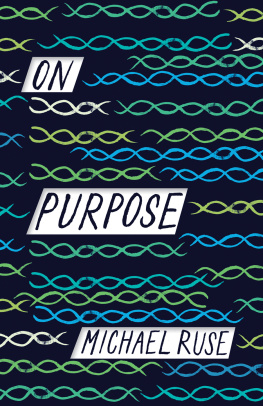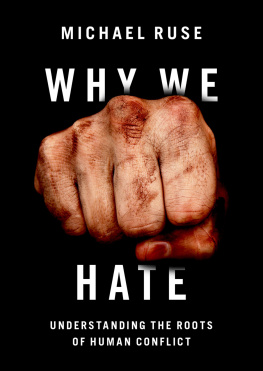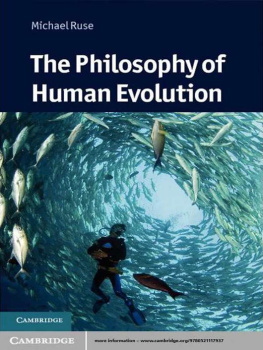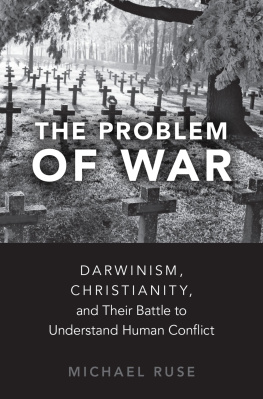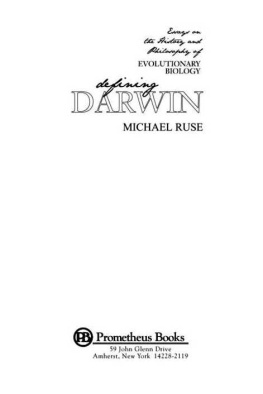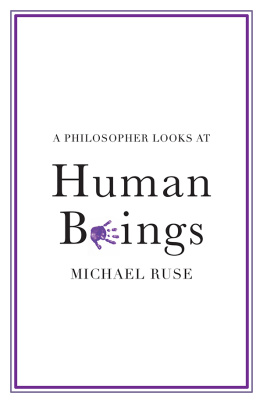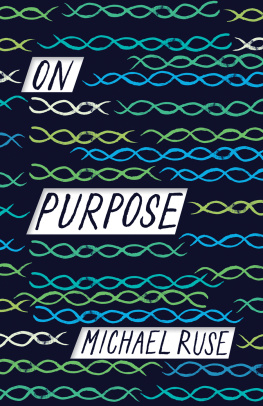Michael Ruse - On Purpose
Here you can read online Michael Ruse - On Purpose full text of the book (entire story) in english for free. Download pdf and epub, get meaning, cover and reviews about this ebook. year: 2017, publisher: Princeton University Press, genre: Religion. Description of the work, (preface) as well as reviews are available. Best literature library LitArk.com created for fans of good reading and offers a wide selection of genres:
Romance novel
Science fiction
Adventure
Detective
Science
History
Home and family
Prose
Art
Politics
Computer
Non-fiction
Religion
Business
Children
Humor
Choose a favorite category and find really read worthwhile books. Enjoy immersion in the world of imagination, feel the emotions of the characters or learn something new for yourself, make an fascinating discovery.
- Book:On Purpose
- Author:
- Publisher:Princeton University Press
- Genre:
- Year:2017
- Rating:4 / 5
- Favourites:Add to favourites
- Your mark:
- 80
- 1
- 2
- 3
- 4
- 5
On Purpose: summary, description and annotation
We offer to read an annotation, description, summary or preface (depends on what the author of the book "On Purpose" wrote himself). If you haven't found the necessary information about the book — write in the comments, we will try to find it.
On Purpose — read online for free the complete book (whole text) full work
Below is the text of the book, divided by pages. System saving the place of the last page read, allows you to conveniently read the book "On Purpose" online for free, without having to search again every time where you left off. Put a bookmark, and you can go to the page where you finished reading at any time.
Font size:
Interval:
Bookmark:

ON PURPOSE
On Purpose

Michael Ruse
PRINCETON UNIVERSITY PRESS
PRINCETON & OXFORD
Copyright 2018 by Princeton University Press
Our little Kinsmenafter Rain from THE POEMS OF EMILY DICKINSON: VARIORUM EDITION, edited by Ralph W. Franklin, Cambridge, Mass.: The Belknap Press of Harvard University Press, Copyright 1998 by the President and Fellows of Harvard College. Copyright 1951, 1955 by the President and Fellows of Harvard College. Copyright renewed 1979, 1983 by the President and Fellows of Harvard College. Copyright 1914, 1918, 1919, 1924, 1929, 1930, 1932, 1935, 1937, 1942 by Martha Dickinson Bianchi. Copyright 1952, 1957, 1958, 1963, 1965 by Mary L. Hampson.
Published by Princeton University Press,
41 William Street, Princeton, New Jersey 08540
In the United Kingdom: Princeton University Press,
6 Oxford Street, Woodstock, Oxfordshire OX20 1TR
press.princeton.edu
Jacket design by Kimberly Glyder
All Rights Reserved
ISBN 978-0-691-17246-0
British Library Cataloging-in-Publication Data is available
This book has been composed in Miller
Printed on acid-free paper.
Printed in the United States of America
10 9 8 7 6 5 4 3 2 1
For Joe and Celine
CONTENTS
ACKNOWLEDGMENTS
THIS PROJECT started nearly half a century ago when I was writing my first book, The Philosophy of Biology (1973). Framed very much in the school of logical empiricismthe leaders were two men whose names and memory I still revere, Ernest Nagel and Carl Peter Hempeleverything was going along swimmingly until I got to the chapter on function or purpose. Something went wrong, for I could not fit the discussion into the mold, especially the mold of science as a value-free inquiry, as an enterprise that drains itself of the human elementin Karl Poppers felicitous phrase, knowledge without a knower. Eventually, I plowed on, or rather through, and the book was finished and published. But the problem of purpose kept nagging awayeven back then I think I had insights into the way things had to goand it has been a lifetimes quest for understanding, frustrating at times but incredibly invigorating. Now I think I know the answer, and it is here in this book, the summing up of a fifty-year obsession with the problem.
So, first, I want to thank Nagel and Hempel for setting me off on this quest. It was from them, as well as from others in the field, I learned that philosophy never stands still; there is always work to be done, criticizing and extending. An insight that never withers is that you learn most from those with whom you disagree most, and I very much hope that this book exemplifies this truth. I am very grateful to my fellow philosophers who have so stimulated me. In a rather different way, I want to thank Plato and Aristotle, Kant and Darwin. As you will see, my quest has taken me back to their writings. It has been a great privilege to spend time with minds such as these. If my huge respect for and sheer enjoyment and excitement at what they produced does not come across on every page, then I have failed myself, I have failed you the reader, and, most sadly, I have failed them. I want this book read in a positive manner. I shall have critical things to say but always in the sense of wanting to move the conversation forward.
At the immediate level, my thanks above all go to my editor at Princeton University Press, Rob Tempio. When he first asked me to write this book, I agreed, believing that it would be a good way of summing up ideas about which I have been thinking and writing for many years. Deftly, he steered me toward imposing on my material a new and, I think, informative framework, looking at old problems in a way that hitherto I had grasped but vaguely. At times, responding to Robs comments, as well as to those of the referees he so astutely chose, I wondered why he and they didnt simply write the book themselves. Socrates once said he was the wisest man alive since he knew one thing, namely, that he knew nothing. Yes, indeed.
I am most grateful to my colleagues, Nat Stein and Randy Clarke, for looking at an earlier version of my manuscript and giving me useful comments. My dear friend, professor at Fordham University and the English-speaking worlds foremost authority on Thomas Aquinas, Brian Davies, pointed to the egregious mistakes I made about the great Christian philosophers. Given the melancholic pleasure that this gave him, I am sure that there is lurking there a new ontological argument about my necessary existence. I am deeply in the debt of my student, assistant, and, above all, friend Jeff OConnor for doing more of the humdrum jobs than one has any right to ask of any person. As always, I pay grateful memory to William and Lucyle Werkmeister, whose legacy made possible my professorship and the research funds attached to it. And finally, above all, I celebrate the love and warm companionship of my family, especially my daughter, Emily, whom you will be meeting, and my wife, Lizzie. You will later learn the context when I say that the trade-off for spending so much time being antisocial and writing this book is that Nutmeg arrived into our lives.
PROLOGUE
Our little Kinsmenafter Rain
In plenty may be seen,
A Pink and Pulpy multitude
The tepid Ground upon.
A needless life, it seemed to me
Until a little Bird
As to a Hospitality
Advanced and breakfasted -
As I of He, so God of Me
I pondered, may have judged,
And left the little Angle Worm
With Modesties enlarged.
EMILY DICKINSON,
WRITTEN ABOUT 1864
A NEEDLESS LIFE. A life without worth. A life without purpose, until the poet saw that the worm was breakfast for the little bird. This notion of purposeunderstanding or doing something in the light of the ends that it servesis interesting and complex. We dont generally use this kind of thinkingfunction talk, making reference to what Aristotelians called final causes and what, since the Enlightenment, has been dubbed teleological thinkingin the physical world, the world of planets and pendulums, of protons and plate tectonics. No one would ask about the purpose of the meteorite that smashed into the earth some sixty-six million years ago, creating such a hostile atmosphere that that was the end of the dinosaurs. It just happened. There was no purpose to it.
For the student, the goal is to get into medical school and lead a fulfilling life rather than end up as an adjunct humanities professor in some part of the world hitherto unknown to civilization.
What makes the whole situation complex and interesting is that, in some real sense, purpose-questions make reference to the future. Note that it is not just a matter of the future being involved. In the physical sciences we think a lot about the future. I am sure that there are today many earth scientists, hunched over their computers, building models about the effects of impacts. But it is prior causes alonewhat are often known as efficient causesto which appeal is made. As one might say, it is turtles all of the way down. Which physical events brought on which physical events and in what fashion, and what are the likelihoods of it all happening again? Likewise, in the case of normal causal processes like physiological development or computer form filling, it is all a matter of efficient causes. But heres the rub! If the dinosaurs died, if the stegosaurus has the weird appendages, if the student has the admission form, you know that the factors bringing all of this about must have occurredeither in the past or at most at the same time as the event or object being studied. In the purpose case, the intended future may never occur. The stegosaurus might get swept away by a flood before it can use its plates; the student might change his or her mind and become something socially valuable, like a stockbroker or banker. What then is going on and why do we keep using purpose-type understanding? Why do we still seek final causes? How can the possibly nonexistent be a determining factor?
Next pageFont size:
Interval:
Bookmark:
Similar books «On Purpose»
Look at similar books to On Purpose. We have selected literature similar in name and meaning in the hope of providing readers with more options to find new, interesting, not yet read works.
Discussion, reviews of the book On Purpose and just readers' own opinions. Leave your comments, write what you think about the work, its meaning or the main characters. Specify what exactly you liked and what you didn't like, and why you think so.

